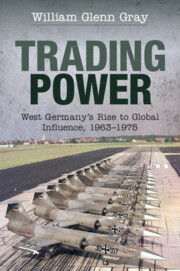Book contents
- Trading Power
- Trading Power
- Copyright page
- Contents
- Figures
- Acknowledgments
- Abbreviations
- Introduction
- 1 The Unraveling of Adenauer’s Grand Strategy (1962–1963)
- 2 America’s Junior Partner (1963–1964)
- 3 Twenty Years After (1964–1965)
- 4 The Stability Imperative (1965–1966)
- 5 Gaullist Temptations (1966–1968)
- 6 The Magnetism of Prosperity (1967–1968)
- 7 A Decisive Election (1969)
- 8 The Zenith of Ostpolitik (1970)
- 9 The European Pendulum (1970–1972)
- 10 Hazards from the Global South (1970–1972)
- 11 The Embattled Chancellor (1971–1972)
- 12 The Center of Europe (1973)
- 13 The Crisis Management Team (1973–1974)
- 14 New Structures for the West (1974–1975)
- Conclusion
- Select Bibliography
- Index
Introduction
Published online by Cambridge University Press: 14 October 2022
- Trading Power
- Trading Power
- Copyright page
- Contents
- Figures
- Acknowledgments
- Abbreviations
- Introduction
- 1 The Unraveling of Adenauer’s Grand Strategy (1962–1963)
- 2 America’s Junior Partner (1963–1964)
- 3 Twenty Years After (1964–1965)
- 4 The Stability Imperative (1965–1966)
- 5 Gaullist Temptations (1966–1968)
- 6 The Magnetism of Prosperity (1967–1968)
- 7 A Decisive Election (1969)
- 8 The Zenith of Ostpolitik (1970)
- 9 The European Pendulum (1970–1972)
- 10 Hazards from the Global South (1970–1972)
- 11 The Embattled Chancellor (1971–1972)
- 12 The Center of Europe (1973)
- 13 The Crisis Management Team (1973–1974)
- 14 New Structures for the West (1974–1975)
- Conclusion
- Select Bibliography
- Index
Summary
The book’s introduction explains why the years 1963 to 1975 were a period of tremendous experimentation in German foreign relations. A succession of relatively weak chancellors gave scope for cabinet members to push in various directions, whether this involved voracious weapons procurement, a single-minded battle against inflation, more generous development aid, or a tighter commitment to European integration. Even in periods of political instability, developments in West Germany had great import for Europe and the world beyond. Historiographically, the introduction stresses the broader historical relevance of German foreign relations: its study reveals the contested values of postwar Germans and how those priorities came to shape the international environment. Methodologically, the chapter presents a brief discussion of constructivism as outlined by political scientists Alexander Wendt and Susan Strange. International relations theory informs the book’s core question – how West Germans shaped and were shaped by the international system.
Keywords
- Type
- Chapter
- Information
- Trading PowerWest Germany's Rise to Global Influence, 1963–1975, pp. 1 - 11Publisher: Cambridge University PressPrint publication year: 2022



